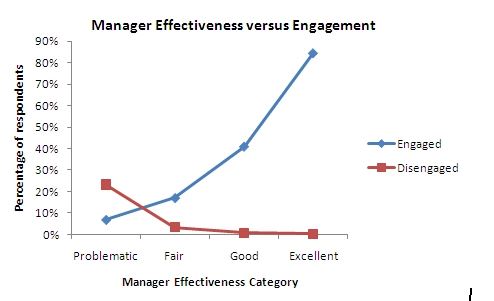It is important to look into the crucial relationship between a manager and an employee
Research, by Gallup, estimates that it is the manager’s ability that accounts for at least 70% of variance in employee engagement scores, across business units.
To have a high level of engagement, managers should ideally guide, direct, and share information readily. But this is not always the case.
Recent research from the Survey Solutions Employee Engagement national database
**SPECIAL: Checklist to Know your Manager
Remember, it is easy to fall into the trap of labeling people as good or bad or blame others – especially in a work context. However, it is difficult to create your own definition of success.
Still keen to know if your boss is a tyrannical despot or a nurturing support at the workplace? We will help you figure it out! Here is a quick 2-step method.
1. You can evaluate your manager on a five point scale and see how he fares across the following key areas:
Sr. No. | Evaluation Criteria | Rating (Rate your manager on the scale of 1 to 5. 1 being the lowest and 5 being the highest.) |
| 1 | Motivation: Say aye! If your manager is able to motivate every single member of your team to take action, while staying true to your company’s mission and vision.This motivation could be in the form of praise for a job well done, or positioning your better in front of the HR team during appraisals or even in terms of more exciting responsibilities. | |
| 2. | Perseverance: Is your manager able to extract suitable outcomes from the team, in the face of adversities and resistance? | |
| 3 | Accountability: Does your manager take the blame when something goes wrong, under his watch? Does he encourage you to take onus for your work too? | |
| 4 | Communicates well: Is your manager able to encourage open dialogue with you and your team members?Can you just walk up to your manager’s room to voice your concerns or share ideas? Is it a manager-employee relationship built on trust and understanding? | |
| 5 | Believes in transparency: Does he give you due credit and publicly acknowledge your efforts in the work?Are his/her actions untouched by favoritism or discrimination? | |
| 6 | Leaves politics out of the workplace: Does he make decisions on the basis of employee productivity, and not cater to office politics? | |
| 7. | Avoids micro-managing: Has your manager learnt the fine art of being clued-in on the workload of his/her team, while not indulging in nit-picking? | |
| 8 | Plays on employees’ strengths: Has your manager been able to map the strengths of his team members? Has he allocated work, basis this understanding? | |
| 9 | Empowers employees: Does he give you the guidance and training you need to grow in the organisation? | |
| 10 | Admits to shortcomings and asks for help. Does your manager admit it when he doesn’t know something and then ask for advice? Does he also endeavor to learn from his mistakes?This is a sign of strength of character and humility, which team-mates will respect. | |
| 11 | Is organised: Does your manager respect your time, and ensure that you are not called for unnecessary meetings? | |
| 12 | Is tactful but not a pushover: Do your boss tactfully avoid confrontations but put his point across firmly? | |
| 13 | Delegates: And is your manager able to delegate work within the team efficiently? Does he ensure that no one employee is overworked? |
A self-service portal at no cost
Conduct 360 feedback at no cost
* No credit card required
2. Find out what the score say about your manager?
65 to 55 – The Inspiring Manager
You have got yourself a manager who is a true leader – get out those bottles of bubbly and toast to him!
These are the people whose footsteps you need to follow. Having such a mentor can really help you achieve great heights at the workplace and beyond, for no one can teach you better work ethics than your manager.
[Great managers are not born; they are molded over years of engagement with their subordinates.]
54 to 25 – The Amateur Manager

Your manager is a rookie and still learning the ropes, but they might just harbor good intent. Good leadership is harder than it looks. Be patient, and keep the communication lines open.
Below 24 – The Clueless Manager
Bad managers (whether cranky control freaks, crazy micro-managers, or bumbling idiots) can be found in all types of organizations.
Such uninspiring leaders are super depressing. Any conversation with them will leave you feeling like you just can’t wait to quit the job or move to another team. This is not healthy in any way.
Find a senior manager to voice your concerns, as having a clueless manager can be detrimental to you career and peace of mind.
16 Characteristics of A Good Boss
- Your manager believes in the power of employee motivation and focuses his efforts and making sure that you are your team-mates are kept engaged at work
- He does not second-guess your employees’ abilities. This ensures that the employees grow confident in their individual roles
- Your manager does not shy away from asking for feedback. If your suggestions cannot be implemented then he takes the time out to explain why.
- Your manager completely avoids discrimination between team members, as he needs them all to work together in order to complete the tasks in hand
- He believes in communicating, communicating and communicating some more – be it through relaxed and non-threatening body language or verbal communication. And more importantly, he is able to listen to your opinions and concerns.
- Your manager is able to lead by example and inspire confidence amongst the team members
- He is flexible when it comes to understanding individual employee needs
- He does not work in silos but encourages working with the team to get tasks completed
- He has an even temperament, which would mean fewer nasty fights and emotional drama at the workplace
- He is able to instruct rather than order, as employees tend to perform better if requests are more tactfully delivered.
- He is organized and prepared to get the most out of meetings; this is turn increases effectiveness and helps in saving time. This is important, as a recent research claims that managers are operating at just over 55% effectiveness, as they are not able to manage their time properly.
- He is able to save costs for his team, and spend money only when necessary.
- He understands and stays up-to-date with the latest HR trends and technology; so that its benefits can make work easier for his employees
- He always places training and development of his subordinates high up in the agenda. This is because he understands that organizational learning measures are very highly correlated to organization effectiveness.
- He realizes that his team-members are his responsibility and thus takes the blame when one of them messes up. Then in private he reprimands/course corrects that employee for his actions.
- He is able to connect with his employees even at a personal level, beyond work, by getting to know their family backgrounds, likes and dislikes. This helps him win the confidence of his people. But he does this without toeing the fine line between friendship and workplace relationship
How A Bad Manager Can Affect Your Company
How good the managers are at your workplace all boils down to your company’s hiring decisions.
[Gallup research states-companies fail to choose right person for the job 82% of the time]
Bad managers can cost your company, billions of dollars each year by:
- » Lowering productivity or misdirecting efforts of employees
- » Lowering employee motivation levels, due to poor employee engagement
- » Creating and unappealing and/or unethical work-culture, thus ruining the company’s image amongst stakeholders
Good talent is hard to come by. So these problems can be fixed only if your company is able to hire talented managers who can fit-in with your work-culture.
[Bad managers shouldn’t affect your performance. Difficult situations only makes you more capable.]
**BONUS: Heads Up For The Manager – Do People Want To Work With You?
Gallup has come up with its “four foundations” to understanding if you are a good manager? These questions may be a little hard to answer and would certainly need you to reflect on your behavior; but it’s worth the effort.
Ask yourself if you are:
- » Demonstrating care, concern and interest in employee affairs?
- » Clear in projecting what’s expected of your staff?
- » Able to make your people work to their strengths?
- » Able to proactively provide support when employees are stretched?
- » Providing positive feedback and encouragement?
- » Creating the right conditions for people to want to work with you?
The results may surprise you and give you enough material to improve yourself and become the manager that employees dream of having!
To make managers more efficient and competent in their work, provide them suitable tools that would accelerate their productivity and help them manage team’s data effectively.







